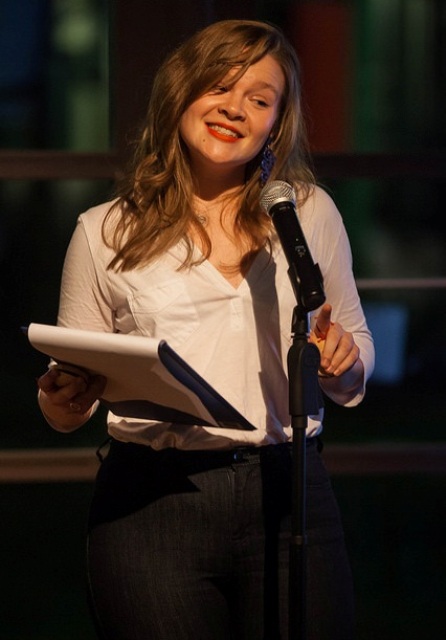myth busting women & literature: q&a with rosanna stevens

Rosanna Stevens (Image credit: Adam Thomas)
At Myth Busting Women and Literature, a collaborative event between Feminartsy and Ainslie and Gorman Arts Centres in Canberra, three local women writers addressed a number of myths that seem to perpetuate the discourse of women in literature. Each panellist tackled their individual topic with humour and intelligence, drawing out the particular nuances present in these myths.
Dr Julieanne Lamond, an English lecturer at ANU who researches the relationship between literary and popular cultures of reading and gender reviewing in Australia, discussed the fact that critics don’t use the word “great” when reviewing literature written by women, and that this isn’t a reflection on women’s ability as writers, but rather a very old gender bias in the literary world.
Dr Lucy Neave, an author and creative writing teacher at ANU, addressed the myth that women only write about frivolous topics, pointing out that women and women’s stories, particularly those relating to domestic life, are inherently devalued, and that it is also simply not true that women are not writing about serious topics.
Rosanna Stevens, a non-fiction writer and menstruation researcher at ANU, pointed out that women writers are just as capable of writing about men as they are about women, and in fact, women writers seem to write predominately straight white male centric stories very successfully (JK Rowling, Mary Shelley). The problem is that people just assume the reader will most easily associate with these narratives.
I was able to speak to Rosanna Stevens before the panel to ask her some more personal questions.
When and how did you first realise that there was a huge gender imbalance in literature?
Growing up I read Morris Gleitzman and Steven Herrick and Paul Jennings, sure, but I was probably most enthralled by Jackie French, Irene Savvides, Tamora Pierce, and Bonnie Bryant and her ghostwriters (hardcore Saddle Club nerd, right here). As a young and teen reader, I wasn’t so aware of any imbalance because I was constantly so surrounded by characters and writers I was drawn to, and I’d just buy them. But part of not being aware of something is the fact that humans are often encouraged to accept things as they are: I also didn’t notice the lack of writers and characters of colour, queer writers and characters, and writers and characters with disability. It’s important to talk about that: what we don’t notice when facts and figures point to exactly that “invisible” issue.
What do you think is the greatest myth around women in literature?
That there isn’t enough room for or interest in marginalised voices.
Women worry about this myth, men worry about it, publicists and publishers worry about it, the media worries about it, and writers with voices that are marginalised worry about it – all for totally, totally different reasons. But I think this myth really does centre on the feminine: at very varying levels it serves to silence and push out women of colour, women who are non-cis gendered, queer women, cis-gendered white straight women, even. And this myth also serves to divide and fight one another, rather than making space and listening where I can and need to.
A myth that comes up in literature by women and men, about cis-gendered women and non-cis gendered men, is that we don’t seem to often get our periods – it’s not really a regular occurrence. Like maybe if you’re an Alice Munro character, you will likely get your period at some point. If you’re in Alice Walker’s The Colour Purple, you might not get your period but Alice Walker will write a letter to the International Indian Treaty Council in 1989 openly opposing segregating menstruating women from everyone else in religious ceremonies. If Tim Winton is imagining your role as a woman, you probably won’t menstruate, but you probably will subtly hate yourself and/or be a martyr for a man, or for some children. If you’re a newborn in Lorrie Moore’s writing you get to bleed out your anus. If you’ve been penned into a Suzanne Collins book YOU ARE BARRON. NO PERIOD FOR YOU, KATNISS EVERDEEN. And none for you either, Elizabeth Bennett. Or Gretchen Weiners.
What do you think are the biggest barriers still facing female writers?
Oh my god, that is a massive question because it depends on who you are and the experiences you’ve had. The biggest barriers facing female writers are poverty, illiteracy, racism, mental health, homelessness, homophobia, transphobia, drug addiction, shame, colonialism, and, of course, stopping yourself from writing because you feel as though audiences and editors and publishers aren’t going to see your work as good enough, or depicting a sellable or valid life experience, even though it might be true to you and your voice.
What advice would you give to women who want to become writers?
Have friends who are writers, and friends who aren’t writers, and use both worlds to create the way you write and think. It’s also really important to know why you’re writing: I don’t think I’d write as often or with such determination if I didn’t have a reason to do it. For me, my reasons are simple: to create human compassion, to create cultural and environmental awareness, and to challenge myself and how I think about the world and this skin I’m in. These things might sound like a snoozefest mantra, but when I put it all into action whatever I’m thinking spills out into all kinds of stories and research.
Rosanna is a nonfictionalist and PhD scholar at ANU. She’s a recipient of YWCA Great Ydeas grant and Arts ACT funding to research a collection of essays about menstruation. This year she is co-judging the Scribe Prize for Nonfiction. You can find her work in The Lifted Brow, The Big Issue and The Believer, and you can find liberating and awkward portions of her life on Twitter: @rosannabeatrice

